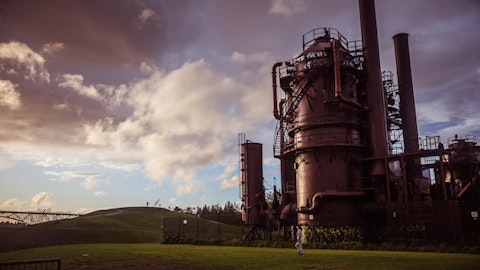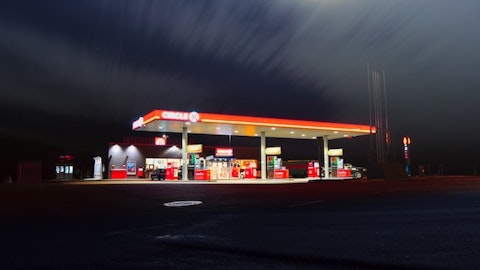Noel Parks: Great. Thanks a lot.
Operator: Your next question comes from the line of Jeff Robertson from Water Tower Research. Please go ahead.
Jeffrey Robertson: Thank you. Philip, to follow up on the Power JV in Yoakum County. Can you talk about what impact that will have on field operations and reliability? And you mentioned that the most recent well you all drilled out there was powered by electricity. And whether or not that has a material impact on the capital costs of new wells.
Philip Riley: Yes. I’ll start and then maybe Bobby can add on to it. You know on costs, we don’t forecast a material improvement in operating costs. I think it’s going to be mostly flat, or it’s going to be immaterial relative to our overall company to really move the needle. That said, we are an investor in it, so we enjoy getting both sides there. On the capital, though, as you note, and as Bobby noted in his intro, we did drill a well there using an electric power, that’s exciting. That’s on the capital side. That could have some reduction there. Generally, we find electric power on a relative basis to be less expensive than diesel. And so, that’s pretty exciting. Again, it’s not a major mover, but little things like that can make a difference. Bobby?
Bobby Riley: Yes. I’ll also say that basically this gives us a great use for our gas in the basin before we try to put it in the highways to get it down on the Gulf coast, so we get an uplift, kind of, in being an investor in the Power JV. And we’re also looking for reliability on our operations, when we had brown ounce or dirty power from our location and the co-op that we’re in, we’re able to — our goal is to increase our run times and efficiencies with cleaner power. So — and basically the use of our residue gas are — that we’re taking in kind from processor.
Philip Riley: Everybody in the basin, you see is experiencing weak natural gas prices. And we’re doing everything we can to try to enhance that value, what we can do within our control. And so we think this is one way, and this is probably the first step for us.
Noel Parks: Seems like the goal is to create value for natural gas in the field as opposed to selling it for a low price and sending it off to the Gulf.
Bobby Riley: Exactly.
Jeffrey Robertson: Lastly, Bobby, there’s obviously been a lot of consolidation in the Permian Basin, and Riley has focused more on conventional long-lived assets. Do you get a sense — or what’s your sense of the market for those assets over the next, let’s say, two years as companies digest their asset bases.
Bobby Riley: The market for conventional or unconventional, I want to clarify.
Jeffrey Robertson: Conventional.
Bobby Riley: Well, obviously, there’s a smaller bucket to choose from. I mean, there’s a lot of people with unconventional assets out there that they’re drawing off some of their top inventory. And a lot of people are starting to look back at conventional opportunities for both horizontal and basically secondary operations and stuff like that. So, I mean, we see assets that have a tremendous amount of PDP involved, thousands of vertical wells. It’s not the most exciting thing that we want to be focusing on. I mean, like we alluded to earlier, the assets that we’re looking for has running room with the drill bit. And I think we’ll have a chance to look at some consolidation opportunities in our area, and look at some upcoming new plays.
Jeffrey Robertson: Thank you.
Operator: Your next question comes from the line of Gary Kennedy from Kennedy Trust Investments. Please go ahead.
Philip Riley: Good morning.
Operator: I’m sorry, Mr. Gary. Please go ahead.
Gary Kennedy: Yes. Okay. I just want to congratulate you on your hedge book, whoever is doing that, did a great job. They look so much better than they did last year, and I see your natural gas has hedged about $2 over what natural gas prices are selling for and going to cowers on the oil seems like a heck of a good idea. So congratulations there. And hopefully, the good work will continue.
Bobby Riley: Thank you, Gary.
Philip Riley: Thank you, Gary.
Operator: [Operator Instructions] The next question comes from [Sandra van den Brink] (ph) from [Tokay] (ph) Capital Corp. Please go ahead.
Unidentified Analyst: Good morning, gentlemen. Congratulations on a good quarter. Some time ago you had put out that you were looking to sell shares to raise cash. And I wondered what had happened to that, if anything.
Philip Riley: Sure. Sandy, this is Philip. Thanks for joining this morning. Last fall, we did have a registration statement for an at-the-money facility, that’s something that we saw as opportunistic given the various opportunities we’re looking at, including that Power JV. It remains outstanding there. As you can tell, we’ve used it in a very limited amount. So far, we’ve been financing the business and these new opportunities through cash flow. So far, we have no plans, nothing else to announce at the moment any change from that.


